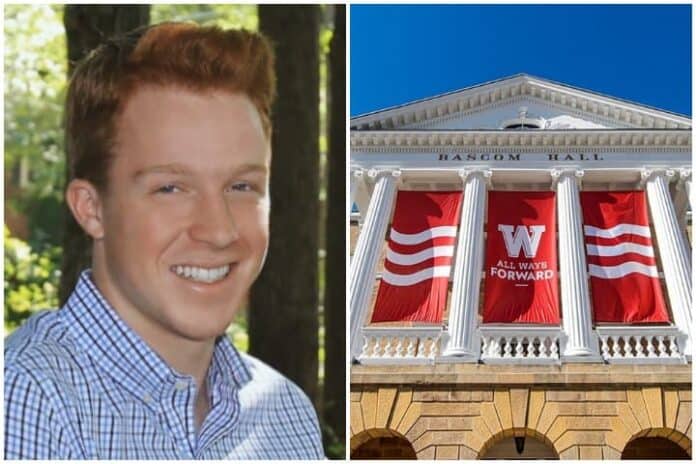Tripp Grebe is a sophomore at the University of Wisconsin – Madison and was a columnist for The Badger Herald, an independent student newspaper at the University.
Last month, he wrote an op-ed opposing the “defund the police” narrative, which was ultimately rejected by the newspaper because “it is too much of a hot take right now” and “would cause a lot of backlash.” Editors claimed the op-ed was rejected because of its content, stating the editorial board had recently published an article endorsing BLM and candidates who are pushing to defund the police.
According to Grebe, he was fired from The Badger Herald after they learned that the fact his story that was censored by them was going public. Grebe’s central premise: “We should increase funding for police departments. The solution to police brutality is better policing, not less policing. We should be training our officers more. By paying more and training more, we can improve the performance of our local police officers.”
Wisconsin Right Now reached out to Grebe; he allowed us to publish the op-ed article.
Tripp Grebe’s Op-Ed Article
The recent murder of George Floyd at the hands of the Minneapolis Police, and the riots and protests that have followed, have forged an essential discussion on police brutality that has been long in the making. In the past, many of us have responded to publicized incidents of police brutality by giving officers the benefit of the doubt because we believe that the other side of the story will justify their actions. We must now reckon that the “other side of the story” does not always absolve police officers’ of wrongdoing. For the first time, many of us now stare directly into the eyes of police brutality’s harsh existence, the same existence that Black people have known to be true their entire lives.
The reignition of the Black Lives Matter movement was undoubtedly justifiable, expected, and necessary in the aftermath of George Floyd’s murder. As the movement gains steam, it forces us to have difficult conversations and continue to stare into the eyes of police brutality’s existence.
Naturally, the recent movement has stirred up intense passion, coupled with anger and frustration – which is a good thing. How could someone not watch the horrific video of George Floyd’s murder and not be angry? What’s not so good is the burning desire that many Americans have to argue with one another. We’ve seen this desire play out as cancel culture’s recent growth has swarmed and infested public and private life.
We should take solace in the fact that virtually all Americans agree – police brutality is a problem, and police reform is necessary. The idea that a vast swath of the country rejects this idea is unfounded. A CBS News poll recently found that 91% of Americans believe that police reform is necessary. We have been witnesses to the spawning of a significant culture shift in our country, and that’s a good thing.
The vast majority of Americans believe that if we want communities, particularly the African American community, to feel protected against gross negligence and abuse of power, police reform must be pursued and enacted. While we’re virtually all in agreement on the problem, the discourse begins when deliberating the solutions to the problem.
In Wisconsin, we’ve seen the calls for police reform amplified, peacefully and violently, in its two largest cities, Milwaukee and Madison. If you’re from Wisconsin, you know that the state’s residents typically don’t share the same grievances as those who live in the Milwaukee and Madison area.
Despite this, rallies and marches against police brutality have occurred across the entire state since the death of George Floyd. The grievances against police brutality are not limited to Milwaukee and Madison area residents, as towns across the state such as Oshkosh, Appleton, Platteville, and Kenosha have seen residents join in the fight against police brutality.
Since this issue is not specific to any part of the state, the state’s Assembly, Senate, and Governor must expostulate with one another to address police brutality. People can post on their Instagram stories all they want. Still, no structural change will be created without thoughtful, comprehensive legislation at the state level.
So, what should police reform look like?
The call to “Defund the Police” has been thrust into the forefront of the police reform debate.
In Milwaukee and Madison, street murals reading “Defund the Police” have been painted in giant yellow letters on major city streets. The Milwaukee Common Council is exploring a 10% budget reduction to the police department that would amount to a nearly 30-million-dollar budget cut. State Rep. David Bowen, (D-Milwaukee), and State Rep. Jonathan Brostoff, (D-Milwaukee) have come out in support of Defunding the Police.
This is a bad idea. The majority of the money allotted to police budgets goes towards the officer’s salaries. If we decide to pay our officers less, they have less incentive to do their job well. If we pay officers more, they have an incentive to perform at a high level in efforts to maintain a high paying job. The National Economic Bureau even found statistical evidence that when officers are paid more, their performance increases.
If we’re expecting police officers to be better, why would we be taking money away from them? When schools are failing, we don’t “Defund Schools,” we give them more money and implement new plans to ensure their success. The City of Milwaukee has been defunding the police department for years. This past year the city cut the department’s budget by 60 officers, and the homicide rate in Milwaukee has more than doubled.
We should increase funding for police departments. The solution to police brutality is better policing, not less policing. We should be training our officers more. By paying more and training more, we can improve the performance of our local police officers.
In addition to increasing funding for police departments, the state should extend Act 10 to cover police unions. Police unions present the same danger that other public section unions present; they place their members’ interests over the broader community. Police unions around the country have lobbied against greater transparency in day-to-day policing, public record laws that would make filed complaints against officers’ public, merit-based pay, and banning contracts with private trainers.
Gov. Scott Walker (R-Wisconsin), passed the controversial union reform Act in 2011. However, the Act did not apply to police unions. The Act restricted collective bargaining, ended mandatory union dues, and required contributions to benefits. The implementation of Act 10 allowed school districts to evaluate teacher’s disciplinary decisions on an individual basis and not worry about letting a lousy teacher go even if they had tenure. The same would be true if Act 10 were extended to police unions. Instead of an officer being shielded by the union, the department could evaluate disciplinary decisions on an individual basis and have the ability to fire the officer for any wrongdoing.
Under the Milwaukee Police Union contract, officers can only be interrogated during certain hours of the day, which leaves the officers time to get their story straight. Last year, 93 Milwaukee police officers were disciplined for egregious misconduct, but all kept their jobs. If Act 10 were extended to police unions, it would have the same effect that it’s had on teachers’ unions. It would provide departments the ability to promote their officers based on performance, not age. And the ability to individually evaluate the misconduct of their officers without police union protection. All in all, extending Act 10 to police unions would make for a more accountable and effective police force.
As we continue to stare directly into the eyes of police brutality’s harsh existence, let’s continue to fight for solutions. Let’s increase training and funding for police while extending Act 10 to cover police unions. By creating a more prepared, effective, and accountable police force, we can take the first step in helping the African American community feel protected against abuse of power from which George Floyd suffered.
Table of Contents







![The COVID Generation: Let’s Stop Scaring Our Kids [WRN Voices]](https://www.wisconsinrightnow.com/wp-content/uploads/2024/04/MixCollage-16-Apr-2024-04-33-PM-2728-218x150.jpg)
















